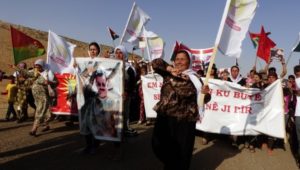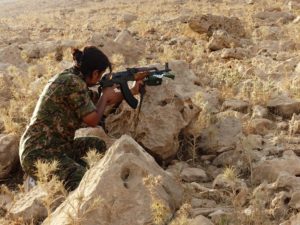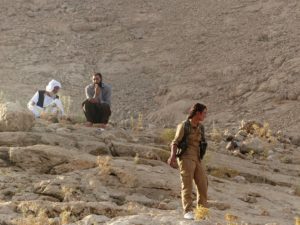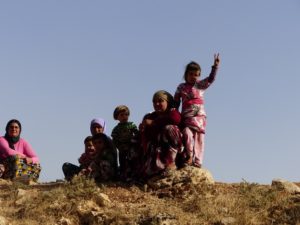(Marcha de protesta de mujeres yazidíes en las montañas de Sinjar en el primer aniversario de la masacre del Estado Islámico.)
Habiendo sufrido un genocigio traumático, las mujeres yazidíes en el Monte Sinjar mobilizan su resistencia autónoma política y armada con la ideología del PKK.
SHENGAL – El viejo dicho kurdo “No tenemos más amigos que las montañas” se volvió más relevante que nunca cuando el 3 de Agosto de 2014, el grupo asesino Estado Islámico lanzó lo que es referido como la 73º masacre contra los yazidíes atacando la ciudad de Sinjar (en kurdo: Shengal), asesinando a miles de personas, y violando y secuestrando a las mujeres para venderlas como esclavas sexuales. Diez mil yazidíes huyeron a las Montañas de Shengal en una marcha de la muerte en la que, y especialmente niños, murieron de hambre, sed y cansancio. Este año ese mismo día, los yazidíes marcharon de nuevo en las Montañas de Shengal. Pero esta vez en una protesta jurando que nada volverá nunca a ser lo mismo.
El año pasado, los pershmerga kurdos iraquís del Partido Democrático de Kurdistán (KDP) prometieron a la gente la seguridad de Shengal, pero huyeron sin previo aviso cuando el grupo Estado Islámico atacó, ni siquiera dejando las armas a la gente para que se defendiesen. En vez, fueron las guerrillas del PKK, así como las Unidades kurdas de Defensa del Pueblo, o YPG, y su brigada de mujeres las YPJ de Rojava, quienes a pesar de tener Kalashnikovs y sólo un puñado de luchadores, abrieron un corredor de seguridad a Rojava, rescatando a 10.000 personas.
Durante todo un año, las mujeres yazidíes han sido representadas por los medios como víctimas violadas indefensas. Incontables entrevistas les preguntaban repetidamente cuántas veces habían sido violadas y vendidas, haciéndoles reavivar sin piedad ese trauma por el bien de la transmisión de noticias sensacionalistas. Las mujeres yazidíes fueron representadas como la personificación del llanto, la mujer pasivamente rendida, la última víctima del grupo Estado Islámico, como la bandera de rendición femenina al patriarcado. Además, las representaciones orientalistas más salvajes grotescamente redujeron una de las religiones más antiguas supervivientes en el mundo a un nuevo campo exótico todavía por explorar.
Ignorado está el hecho de que las mujeres Yazidíes se armaron y ahora se mobilizan ideológica, social, política y militarmente con el marco trazado por Abdullah Öcalan, líder del PKK. En Enero, el Consejo de Fundación de Shengal fue establecido por delegados yazidíes tanto de las montañas como de los campos de refugiados, demandando un sistema de autonomía independiente del gobierno central Iraquí o del KRG. Varios comités de educación, cultura, salud, defensa, mujer, juventud, y economía organizan los temas diarios. El consejo está basado en la autonomía democrática, articulada por Öcalan, y se encontró con una fuerte oposición del KDP, el mismo partido que huyó de Shengal sin luchar. Las recientemente fundadas YBŞ (Unidades de Resistencia de Shengal), el ejercito de mujeres YPJ-Shengal, y el PKK son la primera línea contra el grupo Estado Islámico aquí, sin recibir ni una parte de las armas proporcionadas a los peshmerga por las fuerzas internacionales. Varios miembros de YBŞ y del consejo fueron también arrestados en el Kurdistán Iraquí.
(Una joven luchadora de YPJ-Shengal vigilando la marcha del aniversario junto con ancianos yazidíes.)
El 29 de Julio, mujeres de todas las edades hicieron historia fundando el Consejo de Mujeres de Shengal, prometiendo: “La organización de mujeres yazidíes será la venganza por todas las masacres.” Decidieron que las familias no deben de intervenir cuando las chicas quieren participar en cualquier parte de la lucha y se encomendaron a democratizar y transformar internamente su propia comunidad. Ellas no quieren simplemente “comprar de vuelta” a las mujeres secuestradas, sino liberarlas mediante la mobilización activa estableciendo no sólo una autodefensa física sino filosófica contra toda forma de violencia.
El sistema internacional perniciosamente despolitiza a las personas adectadas por la guerra, especialmente a los refugiados, enmarcando un discurso que los interpreta sin voluntad, conocimiento, conciencia y política. Sin embargo, los refugiados yazidíes en la montaña y en el campo de Newroz en Dêrîk (al-Malikiyah), que fue creado en Rojava inmediatamente después de la masacre, insisten en su acción. Aunque algunas organizaciones internacionales proporcionan ahora ayuda limitada, debido al embargo impuesto por el KRG, casi ninguna ayuda ha sido capaz de entrar a Rojava durante años. La gente del campo Newroz me dijeron que a pesar de los intentos de la Alta Comisión de los Estados Unidos para los Refugiados de modelar el campo y su sistema de educación según su visión de arriba abajo, la asamblea del campo resistió, forzando a una de las mayores instituciones internacionales a respetar su propio sistema autónomo. Ahora, educación en literatura, arte, teatro, cultura, lengua, historia e ideología son enseñadas entre edades, mientras que las unidades de tipo comuna organizan las necesidades y problemas diarios en Dêrîk y Shengal.
“Todos estos consejos, protestas, asambleas, la resistencia, pueden parecer normales. Pero todo esto surgió en cosa de un sólo un año y para Shengal, esto es una revolución”, dijo una de las luchadoras yazidíes del PKK. “La atmósfera de Rojava ha alcanzado Shengal.”
Hedar Reşît, una comandante del PKK de Rojava que enseña sobre sociología en Shengal antes y después del último genocidio, estaba entre las siete personas que lucharon contra el Estado Islámico al principio de la masacre y fue herida mientras habría el corredor a Rojava. La presencia de mujeres como ella provenientes de las cuatro partes de Kurdistán, impacta enormemente en la sociedad de Shengal.
yazidi_resistance_genocide1a.jpg_1907996865“Por primera vez en nuestra historia, hemos tomado las armas porque con la última masacre hemos comprendido que nadie nos protegerá; tenemos que hacerlo nosotras mismas,” me dijo una joven luchadora de YPJ-Shengal, que se renombró así misma como Arîn Mîrkan, una heroína mártir de la resistencia de Kobane. Ella explicó cómo chicas como ella nunca se atreven a tener sueños y sólo se sientan en casa hasta que se casan. Pero como ella, ahora cientos se han unido a la lucha, como la jóven mujer que se cortó el pelo, colgó la trenza en la tumba de su marido mártir, y se unió a la resistencia.
El genocidio físico puede que se termine, pero las mujeres son conscientes de un genocidio “blanco”, es decir, sin sangre, mientras los gobiernos de la UE, especialmente Alemania, intentan atraer a las mujeres yazidíes del extranjero, desarraigándolas de sus hogares sagrados y utilizándolas según su propia agenda.
Madre Xensê, miembro del consejo de mujeres, besa a su nieta y explica: “Recibimos entrenamiento armado, pero la educación ideológica es mucho más importante para que podamos entender el por qué ocurrió la masacre y qué cálculos hicieron la gente a nuestra costa. Esa es nuestra verdadera auto-defensa. Ahora sabemos que fuimos tan vulnerables porque no estábamos organizados. Pero Shengal nunca será la igual. Gracias a Apo (Abdullah Öcalan).”
Sozdar Avesta, una mujer yazidí, miembro de la presidencia del consejo de la Unión de Comunidades del Kurdistán (KCK) y comandante del PKK, explica:
“No es una coincidencia que el grupo Estado Islámico atacase una de las comunidades más antiguas del mundo. Su objetivo es destruir todos los valores étnicos y las culturas de Oriente Medio. Atacando a los yazidíes, intentaban borrar la historia. El grupo Estado Islámico se organiza explícitamente contra la filosofía de Öcalan, contra la liberación de las mujeres, contra la unidad de todas las comunidades. Sin embargo, derrotar al grupo requiere la sociología y lectura histórica adecuadas. Más allá de destruirles físicamente, debemos de eliminar la mentalidad ideológica del Estado Islámico, la cual también persiste en el actual orden mundial.” Hace un año, el mundo observaba el inolvidable genocidio de los yazidíes. Hoy, la misma gente que mientras todos los demás huyeron ellas rescataron a los yazidíes, están siendo bombardeadas por el estado turco partidario del grupo Estado Islámico y con la aprovación de la OTAN. Especialmente cuando los estados que contribuyeron al alzamiento del Estado Islámico prometen derrotarlo y detruyen a su paso el tejido social de Oriente Medio, la única opción de supervivencia es establecer una autodefensa autónoma y una democracia de base.
Mientras una viaja através de las Montañas de Shengal, el indicador más precioso de que el cambio ha alcanzado este lugar herido en un año, son los niños en las calles, quien, cada vez que pasan heval, “los compañeros”, cantan: “Viva la resistencia de Shengal – Viva el PKK – Viva Apo.”
Gracias a la autonomía democrática, los niños que una vez abrieron sus pequeñas manos y pidieron dinero cuando pasaban por ahí los luchadores peshmerga, ahora alzan las mismas manos hechas puños y signos de victoria.
Escrito por Dilar Dirik, integrante del movimiento de mujeres de Kurdistán, escritora y estudiante de doctorado del Departamente de Sociología de la Universidad de Cambridge.
Todas las fotos fueron tomadas por Dilar Dirik.
21 Agosto 2015
Fuente: TeleSur
Traducido por ‘Rojava No Está Sola’
http://www.telesurtv.net/english/opinion/From-Genocide-to-Resistance-Yazidi-Women-Fight-Back-20150821-0014.html
Del genocidio a la resistencia: las mujeres yazidíes contraatacan
From Genocide to Resistance: Yazidi Women Fight Back
SHENGAL – The old Kurdish saying “We have no friends but the mountains” became more relevant than ever when on Aug. 3, 2014, the murderous Islamic State group launched what is referred to as the 73rd massacre on the Yazidis by attacking the city of Sinjar (in Kurdish: Shengal), slaughtering thousands of people, and raping and kidnapping the women to sell them as sex slaves. Ten thousand Yazidis fled to the Shengal Mountains in a death march in which they, and especially children, died of hunger, thirst, and exhaustion. This year on the same day, the Yazidis marched in the Shengal Mountains again. But this time in a protest to vow that nothing will ever be the same again.
Last year, the Iraqi Kurdish peshmerga of the Kurdistan Democratic Party (KDP) promised the people to guarantee Shengal’s safety, but ran away without warning when the Islamic State group attacked, not even leaving arms behind for people to defend themselves. Instead, it was the guerrilla of the PKK, as well as the the Kurdish People’s Defense Units, or YPG, and its women’s brigade the YPJ from Rojava, who in spite of having Kalashnikovs and a only handful of fighters, opened a corridor to Rojava, rescuing 10,000 people.
This content was originally published by teleSUR at the following address:
“http://www.telesurtv.net/english/opinion/From-Genocide-to-Resistance-Yazidi-Women-Fight-Back-20150821-0014.html”. If you intend to use it, please cite the source and provide a link to the original article. www.teleSURtv.net/english
For an entire year, Yazidi women have been portrayed as helpless rape victims by the media. Countless interviews repeatedly asked them how often they were raped and sold, ruthlessly making them relive the trauma for the sake of sensationalist news reporting. Yazidi women were presented as the embodiment of the crying, passively surrendering woman, the ultimate victim of the Islamic State group, the female white flag to patriarchy. Furthermore, the wildest orientalist portrayals grotesquely reduced one of the oldest surviving religions in the world to a new exotic field yet to be explored.
Ignored is the fact that Yazidi women armed themselves and now mobilize ideologically, socially, politically and militarily with the framework laid out by Abdullah Öcalan, leader of the PKK. In January, the Shengal Founding Council was established by Yazidi delegates from both the mountain and the refugee camps, demanding a system of autonomy independent of the central Iraqi government or the KRG. Several committees for education, culture, health, defense, women, youth, and economy organize everyday issues. The council is based on democratic autonomy, as articulated by Öcalan, and met harsh opposition by the KDP, the same party which fled Shengal without a fight. The newly-founded YBŞ (Shengal Resistance Units), the all-women’s army YPJ-Shengal, and the PKK build the frontline against the Islamic State group here, without receiving a share of the weapons provided to the peshmerga by international forces. Several YBŞ and council members were also arrested in Iraqi Kurdistan.
This content was originally published by teleSUR at the following address:
“http://www.telesurtv.net/english/opinion/From-Genocide-to-Resistance-Yazidi-Women-Fight-Back-20150821-0014.html”. If you intend to use it, please cite the source and provide a link to the original article. www.teleSURtv.net/english
On July 29, women of all ages made history by founding the autonomous Shengal Women’s Council, promising: “The organization of Yazidi women will be the revenge for all massacres.” They decided that families must not intervene when girls want to participate in any part of the struggle and committed to internally democratizing and transforming their own community. They do not want to simply “buy back” the kidnapped women, but liberate them through active mobilization by establishing not only a physical, but also a philosophical self-defense against all forms of violence.
The international system insidiously depoliticizes people affected by war, especially refugees, by framing a discourse to render them without will, knowledge, consciousness and politics. Yet, the Yazidi refugees on the mountain and in the Newroz camp in Dêrîk (al-Malikiyah), which was created in Rojava immediately after the massacre, insist on their agency. Though some international organizations provide limited aid now, due to the embargo imposed by the KRG, almost no aid was able to cross to Rojava for years. The people at Newroz Camp told me that in spite of the the Office of the United Nations High Commissioner for Refugees’ attempts to model the camp and its educational system according to its top-down vision, the camp’s assembly resisted, forcing one of the biggest international institutions to respect its own autonomous system. Now, education in literacy, art, theater, culture, language, history, and ideology are taught across ages, while commune-like units organize daily needs and issues in Dêrîk and Shengal.
RELATED: Kurdish Women’s Radical Self-Defense: Armed and Political
“All these councils, protests, meetings, the resistance may seem normal. But all of this emerged within a year only and for Shengal, this is a revolution”, one Yazidi PKK-fighter said. “The atmosphere of Rojava has reached Shengal.”
Hedar Reşît, a PKK-commander from Rojava who teaches about the sociology of Shengal before and after the latest genocide, was among the seven people who fought the Islamic State group at the beginning of the massacre and was wounded opening the corridor to Rojava. The presence of women like her from four parts of Kurdistan enormously impacts the society of Shengal.
“For the first time in our history, we take up arms because with the last massacre, we understood that nobody will protect us; we must do it ourselves,” I was told by a young YPJ-Shengal fighter, who renamed herself after Arîn Mîrkan, a martyred heroine of the resistance of Kobane. She explained how girls like her never dared to have dreams and only sat at home until they got married. But like her, hundreds have joined the struggle now, like the young woman who cut off her hair, hung the braid on her martyred husband’s grave, and joined the resistance.
The physical genocide may be over, but the women are conscious of a “white”, i.e. bloodless genocide, as EU governments, especially Germany, try to lure Yazidi women abroad, uprooting them from their sacred homes and instrumentalizing them for their agendas.
Mother Xensê, member of the women’s council, kisses her granddaughter and explains: “We receive armed training, but ideological education is far more important so that we understand why the massacre happened to us and what calculations people make on our expense. That is our real self-defense. Now we know that we were so vulnerable because we were not organized. But Shengal will never be the same again. Thanks to Apo (Abdullah Öcalan).”
A Yazidi woman herself, Sozdar Avesta, Union of Communities in Kurdistan (KCK) presidency council member and PKK-commander, elaborates:
“It is not a coincidence that the Islamic State group attacked one of the oldest communities in the world. Their aim is to destroy all ethical values and cultures of the Middle East. In attacking the Yazidis, they tried to wipe out history. The Islamic State group explicitly organizes against Öcalan’s philosophy, against women’s liberation, against the unity of all communities. Thus, defeating the group requires the right sociology and history-reading. Beyond physically destroying them, we must also remove the Islamic State group-ideology mentally, which also persists in the current world order.” One year ago, the world watched the unforgettable genocide of the Yazidis. Today, the same people who, while everyone else ran away rescued the Yazidis, are being bombed by the the Islamic State group-supporting Turkish state with the approval of NATO. Especially when the states that contributed to the rise of the Islamic State group promise to defeat it and destroy the social fabric of the Middle East along the way, the only survival option is to establish autonomous self-defense and grassroots democracy.
As one drives through the Shengal Mountains, the most beautiful indicator of the change that hit this wounded place within a year are the children on the streets, who, whenever heval, “the comrades,” drive by, chant: “Long live Shengal’s resistance –Long live the PKK –Long live Apo.”
Thanks to democratic autonomy, the children who once opened their tiny hands and asked for money when peshmerga fighters drove by now raise the same hands to fists and victory signs.
Dilar Dirik, 23, is part of the Kurdish women’s movement, a writer, and PhD student at the Department of Sociology, University of Cambridge.
All photos were taken by Dilar Dirik.
This content was originally published by teleSUR at the following address:
“http://www.telesurtv.net/english/opinion/From-Genocide-to-Resistance-Yazidi-Women-Fight-Back-20150821-0014.html”. If you intend to use it, please cite the source and provide a link to the original article. www.teleSURtv.net/english



